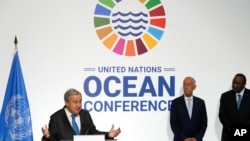There is growing alarm among European and other environmentalists over what they say is governments' failure to ensure healthy oceans, which are vital for food, jobs, biodiversity and clean air.
United Nations Secretary-General Antonio Guterres calls it an "ocean emergency."
"Global heating is pushing ocean temperature to record levels, creating fiercer and more frequent storms," he said. "Sea levels are rising, low-lying island nations face inundation, and some 8 million tons of plastic waste enter the oceans every year."
Those are just some of the threats facing the oceans, which cover 70% of the Earth's surface. Overfishing, shipping and ocean wind turbines also pressure marine ecosystems.
At an ocean conference in Lisbon last week, Guterres and others called for faster, stronger protection measures. But green groups claim the meeting failed to deliver real progress.
Environmentalists hope for better results next month, when countries resume discussions on a global agreement to protect critical ocean ecosystems.
For some, that includes a ban on deep sea mining, which could start as early as 2023.
While countries like China are exploring mining opportunities, critics claim the practice could destroy fragile seabeds and ecosystems. Those critics include President Emmanuel Macron of France.
"I think we have to create the legal framework to stop the high sea mining, and to not allow new activities putting in danger these ecosystems," Macron said. "We know almost nothing about the deep sea. We don't know a lot about the ecosystem. It's a very complex and slow ecosystem. It takes decades or even more for animals to grow."
Tobias Troll, marine policy director for Seas at Risk, an umbrella group of more than 30 European environmental associations, said: "Imagine you put these robots down there — it can trigger all kinds of effects on this ecosystem which can trigger up into the food chain."
In Europe and elsewhere, green groups are pushing countries to meet the ocean promises they've already made. That includes the European Union's 2030 healthy oceans goals. A new environmental report card by six EU nonprofits finds the bloc met just one of eight progress markers last year.
"I think the underlying problem of the situation … is that there is a significant lack of policy coherence around EU legislation around the ocean," Troll said. "For example, we have the marine strategy framework or the fisheries policy, but they don't really work together."
Troll said EU countries are also overselling the progress they've made. Marine protection is a case in point, he said, with only a tiny fraction of Europe's marine habitat truly protected, contrary to official claims.





